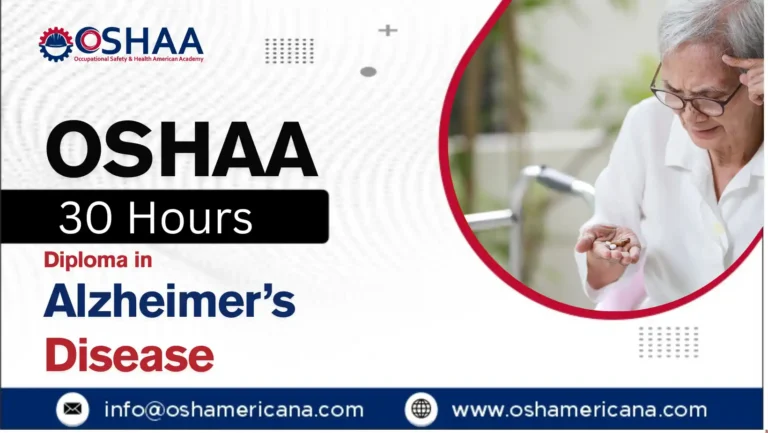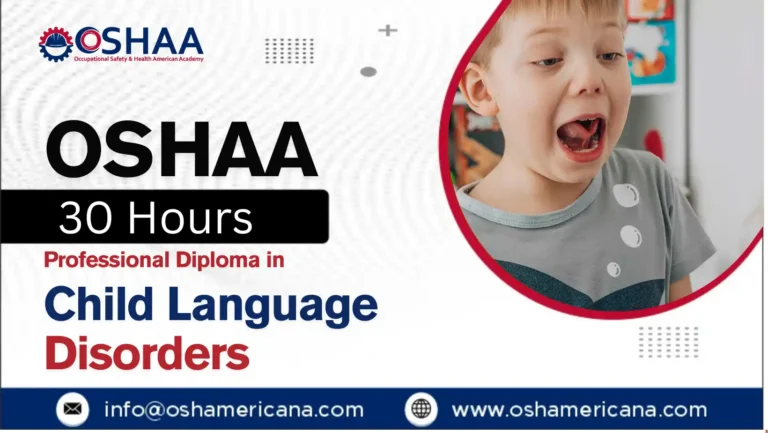Traumatic events are an inevitable part of life, and their impact can last far beyond the initial shock. Post-Traumatic Stress Disorder (PTSD) is a condition that affects many individuals following traumatic events, whether through accidents, abuse, war, or natural disasters. Learning how to deal with shock, trauma, and the psychological aftermath is crucial for both healthcare professionals and individuals working in support services. The OSHAA 30-Hours Diploma in PTSD: Dealing with Shock and Trauma provides in-depth knowledge and practical tools to effectively understand, manage, and support individuals with PTSD.
Post-Traumatic Stress Disorder (PTSD) is a mental health condition that arises after a person experiences or witnesses a life-threatening or highly stressful event. This condition can manifest as flashbacks, nightmares, anxiety, and severe emotional distress. Those affected may experience difficulty in daily functioning, impacting their work, relationships, and overall well-being.
The OSHAA 30-Hours Diploma in PTSD: Dealing with Shock and Trauma offers a comprehensive exploration of PTSD, from its causes to its effects and recovery strategies. This diploma is designed for those who want to build the expertise necessary to assist those who are dealing with trauma, either in clinical settings or in community support roles.
The OSHAA 30-Hours Diploma in PTSD: Dealing with Shock and Trauma is an essential course for anyone who wants to make a difference in the lives of individuals affected by PTSD. Whether you are a healthcare professional, social worker, emergency responder, or volunteer, this course equips you with the tools and knowledge to offer meaningful support to those in need. By gaining a deeper understanding of trauma and PTSD, you can play an important role in the recovery process, helping individuals reclaim their lives and move forward after experiencing devastating events.
OSHAA 30-Hours Diploma in PTSD: Dealing with Shock and Trauma
Study Units
Learning Outcomes
Introduction to PTSD: Understanding Shock and Trauma (2 hours)
- Understand the definition and scope of PTSD and its connection to shock and trauma.
- Learn the impact of traumatic events on individuals and how PTSD develops.
- Recognise the importance of addressing trauma in both personal and professional settings.
- Gain an understanding of how PTSD can affect both individuals and communities.
Causes and Risk Factors of PTSD (4 hours)
- Identify common causes and triggers of PTSD, including accidents, abuse, and natural disasters.
- Understand the risk factors that contribute to the likelihood of developing PTSD.
- Explore how genetics, environment, and previous trauma influence the onset of PTSD.
- Learn to assess the individual risks and vulnerabilities of those affected by traumatic events.
Psychological and Physical Symptoms of PTSD (4 hours)
- Understand the various psychological symptoms of PTSD, such as flashbacks, anxiety, and nightmares.
- Learn to identify physical manifestations of PTSD, including sleep disturbances and chronic pain.
- Recognise how symptoms can impact an individual’s daily life and functioning.
- Gain insights into how these symptoms vary across different individuals and cultures.
Assessment and Diagnosis of PTSD (4 hours)
- Learn the diagnostic criteria and tools used to assess PTSD.
- Understand how to conduct thorough assessments of individuals who may be suffering from PTSD.
- Identify the challenges in diagnosing PTSD and how to differentiate it from other mental health conditions.
- Explore the role of healthcare providers in the accurate diagnosis and treatment of PTSD.
Trauma-Informed Care: Principles and Practices (5 hours)
- Understand the core principles of trauma-informed care and how it applies to PTSD treatment.
- Learn how to create a safe, supportive environment for individuals affected by trauma.
- Gain insights into recognising signs of trauma and responding appropriately in a caring, empathetic manner.
- Understand the importance of building trust and providing empowerment in the recovery process.
Therapeutic Approaches to PTSD Treatment (5 hours)
- Explore various therapeutic approaches for treating PTSD, including cognitive-behavioural therapy (CBT), exposure therapy, and EMDR.
- Learn how to implement different therapeutic techniques based on the needs of the individual.
- Gain an understanding of the role of medications in managing PTSD symptoms.
- Learn about alternative treatments such as mindfulness and art therapy in supporting recovery.
Coping Strategies and Support Mechanisms for PTSD (3 hours)
- Learn effective coping strategies to help individuals manage and reduce PTSD symptoms.
- Gain knowledge of self-care techniques, relaxation methods, and mindfulness practices.
- Understand how to support individuals in building a network of support and fostering resilience.
- Learn how to educate individuals and families on dealing with the challenges of PTSD recovery.
Legal, Ethical, and Social Considerations in PTSD Care (3 hours)
- Understand the legal rights and protections for individuals with PTSD, including confidentiality and informed consent.
- Learn about the ethical considerations in providing care for those affected by trauma.
- Gain knowledge of social and cultural factors that influence the treatment and care of individuals with PTSD.
- Understand the importance of respecting cultural sensitivity and personal dignity when working with PTSD sufferers.
- Comprehensive Understanding of PTSD: Gain an in-depth understanding of the complexities of Post-Traumatic Stress Disorder, from its causes and symptoms to its impact on individuals and communities.
- Practical Tools for Managing Trauma: Learn effective techniques for assessing, diagnosing, and treating PTSD, equipping you with the practical skills to support individuals in their recovery journey.
- Trauma-Informed Care Approach: Master the principles of trauma-informed care, ensuring that you approach PTSD sufferers with empathy, understanding, and the appropriate support strategies.
- Enhanced Career Opportunities: With increasing demand for professionals trained in mental health and trauma care, this course opens doors to various roles in healthcare, counselling, social work, and emergency services.
- Expert-Led Training: Learn from industry experts who provide real-world insights and up-to-date knowledge on best practices for PTSD care and treatment.
- Holistic Approach to Trauma Recovery: The course covers both psychological and physical aspects of PTSD, offering a comprehensive approach to treating and supporting individuals through their recovery.
- Ethical and Legal Awareness: Understand the legal, ethical, and social considerations when working with individuals affected by trauma, ensuring you provide care that is both effective and compliant with professional standards.
- Global Recognition: The diploma is accredited by OSHAA, offering you a globally recognised certification that enhances your professional credibility and qualifications.
- Flexible Learning: The course is delivered online, allowing you to study at your own pace while accessing high-quality learning materials and support.
- Personal and Professional Growth: By understanding PTSD and trauma recovery, you not only enhance your career prospects but also develop personally by being able to provide meaningful support to those in need.
The OSHAA 30-Hours Diploma in PTSD: Dealing with Shock and Trauma is ideal for individuals looking to expand their knowledge and skills in trauma care and mental health support. This course is suited for:
- Healthcare Professionals: Doctors, nurses, and mental health practitioners who wish to enhance their understanding of PTSD and provide better care for individuals suffering from trauma.
- Counsellors and Therapists: Professionals in the mental health field seeking to deepen their expertise in trauma-focused therapy and PTSD treatment.
- Social Workers: Individuals working in social care settings who need to understand PTSD to provide effective support to affected individuals.
- Emergency Services Personnel: First responders, such as paramedics, police officers, and firefighters, who frequently encounter traumatic situations and wish to learn how to better support victims of trauma.
- Educators and School Counselors: Teachers and school psychologists who work with students potentially experiencing PTSD due to various life events, such as bullying or family trauma.
- Support Workers and Volunteers: Those in roles that offer emotional and psychological support to vulnerable individuals, including domestic violence shelters, rehabilitation centres, and crisis helplines.
- HR and Workplace Health Professionals: Human resources managers and workplace well-being professionals who aim to foster a trauma-aware environment and support employees who have experienced trauma.
- Anyone Interested in Mental Health and Trauma Care: Individuals looking to develop a deeper understanding of PTSD and its impact, as well as those interested in providing care and support in various settings.
This course is designed for anyone seeking to gain expertise in PTSD management, providing essential knowledge for professionals who deal with trauma on a daily basis or individuals who wish to support those affected by traumatic events.







